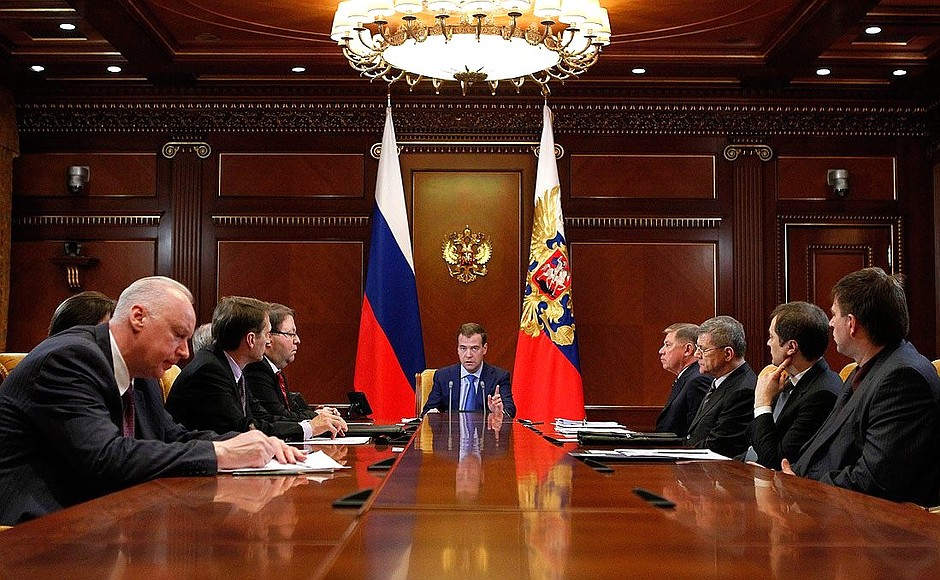
The meeting was attended by Constitutional Court President Valery Zorkin, Supreme Court President Vyacheslav Lebedev, Higher Arbitration Court President Anton Ivanov, Prosecutor General Yury Chaika, Chief of Staff of the Presidential Executive Office Sergei Naryshkin, First Deputy Chief of Staff of the Presidential Executive Office Vladislav Surkov, Presidential Aide and Head of the State Legal Department Larisa Brychyova, Justice Minister Alexander Konovalov, and Chairman of the Investigative Committee Alexander Bastrykin.
* * *
President of Russia Dmitry Medvedev: Good afternoon, colleagues. Our meetings have already become a regular occurrence and today I would like to highlight two issues. Naturally, we can also talk about other matters, just as it usually happens.
One of these issues is very complicated and has wide public implications. It concerns the so-called non-procedural petitions to the court. Unfortunately, all of you know perfectly well what I am referring to: the practice of petitioning presidents of courts with requests to provide an objective, complete and comprehensive review of a given case, and to take the case under personal supervision. Regrettably, this practice is rather common in our country, and we must not turn a blind eye to it. I am not saying that all those petitions are initially corrupt in their nature. Often they are submitted by professional associations, the so-called corporate groups or state officials such as governors or heads of other executive agencies, speakers or members of our Parliament.
“The issue of non-procedural petitions to the court is very complicated and has wide public implications. It concerns the practice of petitioning presidents of courts with requests to take the case under personal supervision. This it is a violation not only of ethical but also of legal standards, constitutional norms. Such petitions violate the principle of equality of all Russian people before the court and the law.”
At first glance, all those who submit petitions to the court exercise their right to communication, the right to petition the authorities. It has always been like that in our country. The aim of such petitions is utterly respectable: to ensure that the court arrives at a fair and just decision. However, as lawyers and as people who are interested in the development of a modern independent judicial system, we all understand that it is a violation not only of ethical but also of legal standards, namely the constitutional norms.
First, we must proceed from the fact that only a very narrow circle of people can submit non-procedural petitions. The majority of Russian citizens do not have this opportunity. Consequently, such petitions violate the principle of equality of all Russian people before the court and the law.
Secondly, it can be interpreted as a lack of respect towards or distrust of the court, since the petitions authors seem to assume that the court may come to a wrong or unjust decision.
Finally, it is a direct violation of the principle of courts’ and judges’ independence, so please take personal control and look more closely into this matter. I am referring to Article 120 of our country’s Constitution.
Incidentally, Mr Lebedev [Vyacheslav Lebedev, President of the Supreme Court] said in an interview that the pressure on judges continues unabated. To combat this phenomenon, it is necessary to improve the judicial culture in general. I could not agree more with this. This is particularly relevant for those who should already have at least a modicum of legal knowledge, including government officials and deputies of different levels.
It is obvious that the practice of non-procedural petitions to courts is so deeply ingrained also because for many years the correspondence on such issues between government agencies and officials was confidential, and such petitions did not affect the reputations of the people submitting them in any way. Nobody would have suspected such a person of abusing his or her official position. Meanwhile, for most politicians their reputation is vitally important; in fact, it is an essential condition for their ability to hold public positions. Therefore, I propose that today we discuss making information on such petitions to the presidents of courts of all levels public, and what could be done about the situation.
You know what the international practice is. Courts in some American states record all petitions submitted: this includes letters, telephone calls and questions submitted in one form or another regarding a particular case. Before the hearing begins, the judge often simply reports who had shown an interest in that dispute. It seems to me that this is not unreasonable, though, of course, it is necessary to consider the matter in the context of our legal and judicial traditions.
Certain steps are being taken already. As far as I know, the Supreme Arbitration Court publishes information about petitions to the court. (Addressing President of the Supreme Arbitration Court Anton Ivanov) Isn’t that right, Mr Ivanov? Your website contains this information. The effect from this measure is probably not immediate but it is real. I don’t know how many people use this resource, this section of the website, but it is clear that at least one interested group of persons checks it on a regular basis: journalists and all those interested in the work of the judiciary. This group regularly tells its readers how parliament members and governors look after certain businesses. It is necessary to analyse the effect of such websites and perhaps extend this practice across the board.
There is one more issue I would also like us to discuss. We need to consider whether it would be enough to remedy the situation by issuing internal documents, orders by presidents of the Supreme Courts and your internal papers, or whether it must be addressed at the legislative level.
“The protection of children from sex crimes is another issue that causes great concern. We all understand how dangerous these kinds of crimes against minors are, and the attitude towards those who commit such crimes should also be as strict as possible. A liberal approach to this matter is totally unacceptable.”
Another issue causes great concern. It is from a completely different sphere but unfortunately, it is also highly relevant in our country: the protection of children from sex crimes. I have already issued instructions to take measures to prevent such crimes. As far as I know, the Investigative Committee has drafted a package of amendments to the Criminal Code. We all understand how dangerous these kinds of crimes against minors are, and the horrific effect they often have on the victims. The attitude towards those who commit such crimes should also be as strict as possible.
The state must use all of its resources in this regard and maintain the strictest control. A liberal approach to this matter is totally unacceptable. Therefore, I propose that we discuss the measures and methods that are used in other countries, including medical treatment of such offenders, the possible use of certain injections that block the action of hormones. This should apply only to sexual offenders, and in all likelihood, it is possible only on a voluntary basis.
Nevertheless, this measure is actively debated in our country. A number of developed countries have adopted it and it is reflected in their legislation. I do not want to affect the decision on this issue, it must be widely debated because it is an entirely new approach. However, considering the terrible nature of the crimes committed, I believe it is our duty to at least consider the issue. The final decision will be mine.
<…>

